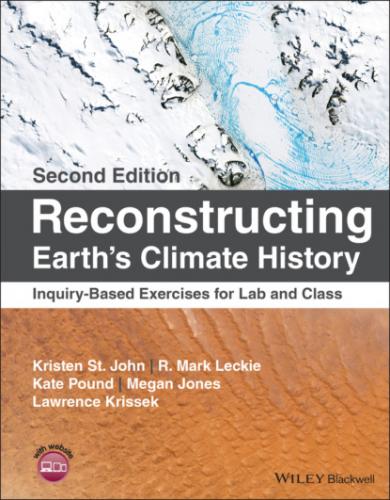Table of Contents
1 Cover
7 Book Introduction to the Second Edition for Students and Instructors Motivation and Purpose Use of Real Data Content Topics Transportable Skills Practical Use of Multipart Exercises Audience Classroom Tested
9 Chapter 1: Introduction to Paleoclimate Records Part 1.1. Archives and Proxies Part 1.2. Obtaining Cores from Terrestrial and Marine Paleoclimate Archives Part 1.3. Owens Lake – An Introductory Case Study of Paleoclimate Reconstruction References
10 Chapter 2: Seafloor Sediments Part 2.1. Sediment Predictions Part 2.2. Core Observation and Description Part 2.3. Sediment Composition Part 2.4. Seafloor Sediment Synthesis References
11 Chapter 3: Geologic Time and Geochronology Part 3.1. The Geologic Timescale Part 3.2. Principles of Stratigraphy and Determining Relative Ages Part 3.3. Radiometric Age Dating Fundamentals Part 3.4. Using40K – 40Ar Dating to Determine the Numerical Ages of Layered Volcanic Rocks Part 3.5. Using Uranium Series Dating to Determine Changes in Growth Rate of Speleothems References
12 Chapter 4: Paleomagnetism and Magnetostratigraphy Part 4.1. Earth's Magnetic Field Today and the Paleomagnetic Record of Deep‐Sea Sediments Part 4.2. History of Discovery: Paleomagnetism in Ocean Crust and Marine Sediments Part 4.3. Using Paleomagnetism to Test the Seafloor Spreading Hypothesis Part 4.4. The Geomagnetic Polarity Timescale References
13 Chapter 5: Microfossils and Biostratigraphy Part 5.1. What Are Microfossils? Why Are They Important in Climate Change Science? Part 5.2. Microfossils in Deep‐Sea Sediments Part 5.3. Application of Microfossil First and Last Occurrences Part 5.4. Using Microfossil Datums to Calculate Sedimentation Rates Part 5.5. How Reliable Are Microfossil Datums? Part 5.6. Organic‐Walled Microfossils: Marine Dinoflagellates and Terrestrial Pollen and Spores References
14 Chapter 6: CO2 as a Climate Regulator During the Phanerozoic and Today Part 6.1. The Short‐Term Global Carbon Cycle Part 6.2. CO2 and Temperature Part 6.4. The Long‐Term Global Carbon Cycle, CO2, and Phanerozoic Climate History Part 6.5. Carbon Isotopes as a Tool for Tracking Changes in the Carbon Cycle References
15 Chapter 7: Oxygen Isotopes as Proxies of Climate Change Part 7.1. Introduction to Oxygen Isotope Records from Ice and Ocean Sediments Part 7.2. The Hydrologic Cycle and Isotopic Fractionation Part 7.3. δ18O in Meteoric Water and Glacial Ice Part 7.4. δ18O in Marine Sediments References
16
Chapter 8: Climate Cycles
Part 8.1. Patterns and Periodicities
Part 8.2. Orbital Metronome
Part
